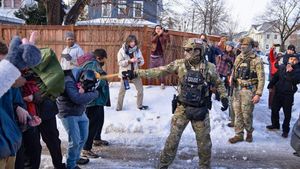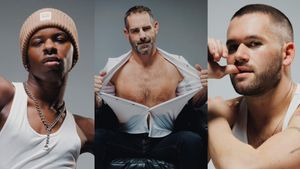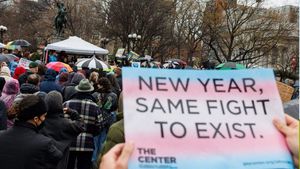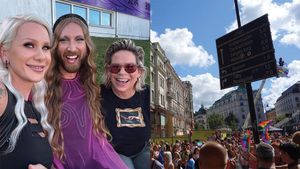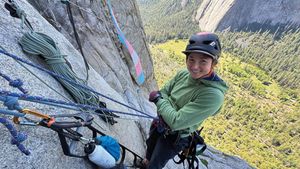Treatment GuideJust DiagnosedSex & DatingAfrican AmericanStigmaAsk the HIV DocPrEP En EspañolNewsVoicesPrint IssueVideoOut 100
CONTACTCAREER OPPORTUNITIESADVERTISE WITH USPRIVACY POLICYPRIVACY PREFERENCESTERMS OF USELEGAL NOTICE
© 2026 Pride Publishing Inc.
All Rights reserved
All Rights reserved
By continuing to use our site, you agree to our Privacy Policy and Terms of Use.
Every Monday, Richard* gets together with 12 other HIV-positive seniors for their weekly support group in New York City. The majority of the members are like Richard, older gay men who have been living with HIV for many years.But there are some new faces, too. 'One or two have been recently diagnosed, like within the last one or two years,' Richard says. 'Some say, 'How could I have been so stupid?' There's a mixture of surprise and regret." Thirty years after the first diagnosis, seniors are the fastest-growing segment of the HIV-positive population. In fact, according to the American Association of Retired Persons half of all HIV-positive Americans will be over 50 by 2017.. It's not just the graying of longtime survivors leading to the surge; older Americans are contracting HIV in alarming numbers, too; One in seven new HIV diagnoses is in a person over 50. While we rarely see people over 60 (or even 50) in movies or on television as anything other than chaste grannies and grumpy old men, plenty of people in their sunset years are getting their groove on. The New York City Department for the Aging reminds people in their fact sheet on HIV and seniors that, 'Older Americans continue to be sexually active; they are also less likely to use protection because pregnancy is not an issue post-menopause.' Erectile-dysfunction drugs have made later-in-life sex more of a possibility than in previous decades, which is good news for many seniors since elderly people having sex at least once a month report higher levels of happiness than those abstaining. The bad news, though, is that Viagra and Cialis haven't necessarily changed older men's behavior when it comes to protection. A recent study found that 50-year-old men are six times less likely to use a condom than men in their 20s. Older women, as sexually active as men, figure high in the growing ranks of HIVers. In part because for widows and divorc'es stepping into the dating pool for the first time in decades, HIV may not be a consideration. 'HIV is really affecting black women, 45 and over,' Grammy Award-winning singer and longtime AIDS advocate Patti Austin tells HIV Plus. 'We're so happy to get laid that we're not doing the research beforehand.' Whether because of embarrassment or guilt, studies show older Americans are less likely to speak to their doctors about HIV-related concerns than their younger counterparts. But getting good medical information is important because there are several risk factors that make seniors more susceptible to transmission, according to James Masten, PhD, author of Aging with HIV: A Gay Man's Guide. 'There is very little outreach and education targeting midlife and older people,' Masten says. 'And, while we can remain sexually active well into older age, there is a cultural bias that older adults are not sexually active and prevention efforts are not developed to target this population. This is even more significant as changes in our bodies, such as thinning skin, increased dryness of mucus membranes, and changes to our immune system, put us at greater risk for HIV infection.' Only about a third of older men and a fifth of older women discussed sex with a doctor since they turned 50, according to a survey by ElderCare.gov. The lack of communication goes both ways, too. 'I think part of it is the perception among doctors that after you reach a certain age', 40 or 45, you don't have sex,' Richard says. 'If you're a senior and going to a 30-year-old ageist doctor who assumes you're over-the-hill and not having sex, they're not looking at you as a human being with the full potential for risks.' Doctors and senior patients treating testing as an afterthought has repercussions, says Helena Bushong, a 61-year-old HIV-positive transgender woman living in Chicago. Bushong knows many 'late-testing' lesbian, gay, bisexual, and transgender (LGBT) seniors who didn't come in for a test until after experiencing HIV-related symptoms for months, sometimes years. Some may have thought the symptoms were simply age-related. 'These seniors may have been living with the disease for years and are just emotionally unprepared to deal with the consequence of being told they have a life changing disease such as HIV, on top of everything else they may have been living with as an older LGBT adult,' she says. Improving the lives of LGBT elders is the mission of SAGE (Services and Advocacy for Gay, Lesbian, Bisexual, and Transgender Elders), a national advocacy organization based in New York. The organization is adapting to a growing number of clients living with HIV; the support group that Richard attends is SAGE-sponsored and was the first such group for HIV-positive seniors. 'Social isolation among LGBT elders, delayed care seeking, and lack of prevention messages aimed at older people all combine to create big challenges..." says Michael Adams, SAGE executive director."Including more risk of infection.' Something affecting all HIV-positive seniors, whether gay or straight, is their aging bodies. The production of T-cells decline as we grow older and drops off dramatically around age 55. Before antiretroviral therapy, survival rates were much shorter for older HIV-positive people than those contracting the disease in their 20s and 30s. 'There are no specific treatment guidelines currently available that focus on management in the older HIV-infected adult,' reads 'HIV Infection in the Elderly,' a 2008 article in the Clinical Interventions in Aging journal. 'Additionally, there is limited information on the efficacy and safety of selected antiretroviral regimens for older patients.' Little has changed since that article was published. It's still not clear how drug regimens affect someone after decades, or the differences in how a 60-year-old body and a 30-year-old body deal with combination therapy. Some studies have shown that a decrease in kidney function, common with age, can lead to higher drug toxicity'but little is conclusive. Don't expect answers to these health questions soon. Even though people are living longer with HIV and transmission rates are not slowing down, there is little in the way of advocacy for HIV-positive seniors. There is no national organization devoted to this group lobbying Congress for more funding, whether for prevention campaigns, home health care, or studies on the longterm effect of HAART treatment. The nonprofit AIDS Institute launched the National HIV/AIDS and Aging Awareness Day (September 18) in 2008, though it's little known of. Effective or not, the AIDS Institute is at least attempting to shed light on the problem of this invisible community. Richard, in New York, says that, the newcomers to his group "know HIV is not the death sentence it was 20 years ago' but because of entrenched stigma, most people in his support group are terrified of disclosing their status to others. 'The reaction is always unexpected,' he says. 'If you have a new caregiver, you don't know what kind of prejudices they're going to have. That can definitely affect the quality of care, if the person taking care of you is phobic about the disease.' Bushong, in Chicago, wants HIV-positive seniors to become a topic in the national conversation immediately.. 'I believe the medical field is grossly unprepared for what's coming down the pipeline,' she says. 'There will be an epidemic of aging patients with HIV/AIDS in the next 10 years, many with other pre-existing conditions. The question [for the medical community] is, 'How do we give value to people who society has already told have none'?' *last name withheld by request
From our Sponsors
Most Popular
“So much life to live”: Eric Nieves on thriving with HIV
September 03 2025 11:37 AM
The Talk: Beyond the exam room
August 13 2025 3:15 PM
Thanks to U=U, HIV-positive people can live long, happy, healthy lives
July 25 2025 2:37 PM
Messenger RNA could be the key to an HIV vaccine — but government cuts pose a threat
August 20 2025 8:02 AM
It’s National PrEP Day! Learn the latest about HIV prevention
October 10 2025 9:00 AM
Amazing People of 2025: Javier Muñoz
October 17 2025 7:35 PM
The Talk: Starting the conversation
July 25 2025 4:47 PM
The lab coat just got queer
August 21 2025 10:00 AM
The Talk: Owning your voice
August 25 2025 8:16 PM
“I am the steward of my ship”: John Gibson rewrites his HIV narrative
September 16 2025 2:56 PM
Plus: Featured Video
Latest Stories
HIV-positive men stage 'Kiss-In' protest at U.S.-Mexico border
December 01 2025 12:56 PM
What the AIDS crisis stole from Black gay men
December 01 2025 6:00 AM
The Talk: Navigating your treatment
August 01 2025 6:02 PM
How the Black AIDS Institute continues to fill in the gaps
July 25 2025 1:06 PM
“I felt like a butterfly”: Niko Flowers on reclaiming life with HIV
July 23 2025 12:22 PM
Dancer. Healer. Survivor. DéShaun Armbrister is all of the above
July 02 2025 8:23 PM
BREAKING: Supreme Court rules to save free access to preventive care, including PrEP
June 27 2025 10:32 AM
1985: the year the AIDS crisis finally broke through the silence
June 26 2025 11:24 AM
VIDEO: A man living with HIV discusses his journey to fatherhood
June 10 2025 4:58 PM
Trump admin guts $258 million in funding for HIV vaccine research
June 03 2025 3:47 PM
Grindr is reminding us why jockstraps are so sexy and iconic
May 02 2025 5:36 PM
HRC holds 'die-in' to protest Trump health care cuts
April 28 2025 2:11 PM
Two right-wing Supreme Court justices signal they may uphold access to PrEP and more
April 21 2025 4:10 PM
500,000 Children at Risk: PEPFAR Funding Crisis
April 08 2025 3:51 PM
Broadway's best raise over $1 million for LGBTQ+ and HIV causes
April 03 2025 7:15 PM
The Talk Season 5 premieres this spring with HIV guidance for the newly diagnosed
March 26 2025 1:00 PM










































